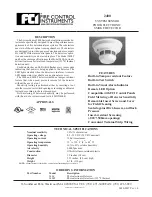
For units that are used as single smoke alarms, do not connect the yellow wire to anything.
Insulate this wire (tape it) in place to make certain the yellow wire cannot contact any
metal parts.
Interconnected units can provide earlier warning of fire than stand-alone units, especially
if a fire starts in a remote area of the dwelling. This smoke alarm may be interconnected
with as many as 11 other USI ELECTRIC model smoke alarms such as USI-1103, USI-
1203, USI-1204, USI-1208, USI-1209, USI-1213, USI-2204, USI-3204, USI-5204 and 6 other
units which may be a combination of Carbon Monoxide Alarms such as USI-7385, USI-
7390, USI-7485, USI-7490, USI-7795, Heat Alarms/USI-2430 or Relay Modules/USI-960 for
a total of not more than 18 interconnected devices.
Interconnected CO alarms will only respond if a CO alarm / event initiates the alarm. All
other alarms remain silent.
Interconnected smoke alarms, heat alarms and relay modules will only respond if a smoke
alarm / event or heat alarm / event initiates the alarm. All CO alarms remain silent.
NOTE: Relay Modules/USI-960 will not respond if a CO alarm / event initiates the alarm.
NOTE: Units without battery backup will not respond during an AC power failure.
The yellow wire is used only for multiple station operation with USI ELECTRIC Model
alarms only. Connecting this yellow wire to any other circuits may result in damage.
When alarms are interconnected, all units must be powered from a single AC branch
circuit. If local codes do not permit be sure the neutral wire is common to both phases. The
maximum wire run distance between the first and last alarm/device in an interconnected
system is 1,000 feet. NOTE: Use standard household wire (18 gauge or larger, rated at
least 300V, as required by local codes) available at all electrical supply/hardware stores.
The wiring to be used shall be in accordance with the provisions of Articles 210 and
300.3(B) of the National Electrical Code, ANSI/NFPA 70. In addition, the resistance of the
interconnecting wiring shall be a maximum of 10 Ohms.
Page 4
Early warning fire detection is best achieved by the installation of fire detection equipment
in all rooms and areas of the household as follows: A smoke alarm installed in each
separate sleeping area (in the vicinity of, but outside of, the bedrooms) and heat or smoke
alarms in living rooms, dining rooms, kitchens, hallways, attics, furnace rooms, closets,
utility storage rooms, basements and attached garages. Test the smoke alarm weekly to
assure proper operation.
3.
Attach the mounting plate to the electrical junction box.
4.
To activate 9 volt battery and alarm, hold the QUICK DRAW
TM
battery drawer closed, pull
and remove the PULL-TAB. Discard PULL-TAB.
5.
Plug the AC QUICK CONNECTOR into the alarm base. Push and turn the alarm clockwise
onto the mounting plate.
6.
See "TAMPER LOCKING PIN."
2.
Wiring Instructions:
a.
The appropriate power supply is 120 Volt single phase power supplied from a non-
switchable circuit NOT protected by a ground fault circuit interrupter.
b.
Turn off main power to the circuit before wiring the smoke alarm.
c.
There are three pigtail leads (black, white and yellow) coming from the AC QUICK
CONNECTOR. The proper wire connection is as follows:
WIRES FROM QUICK CONNECTOR
CONNECT TO
BLACK
"HOT" side of AC line
WHITE
"NEUTRAL" side of AC line
YELLOW
Interconnect wires of other units
INPUT:
120 VAC
60 HZ
.05A

























